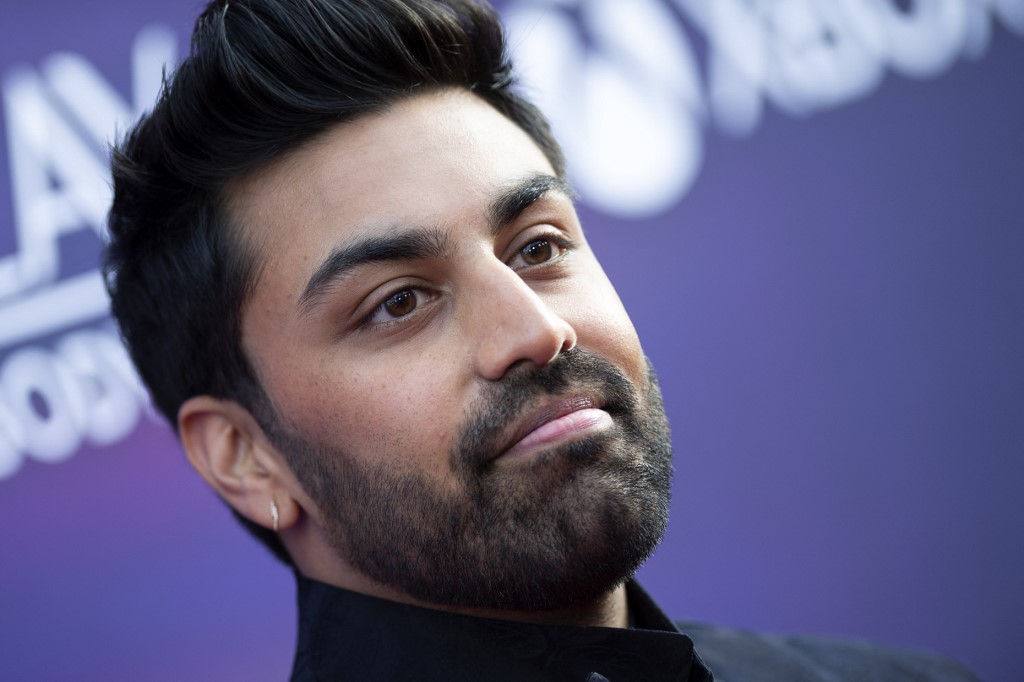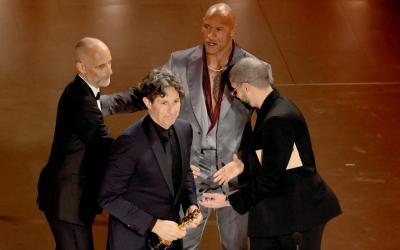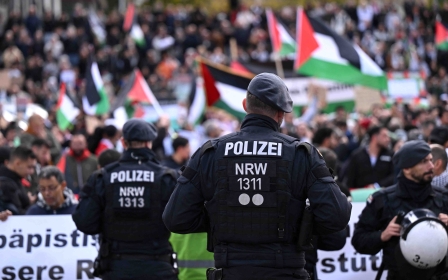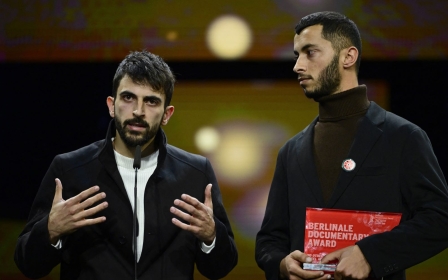Hollywood, what did you do during Israel’s war on Gaza?

Last week, the grassroots organisation Cinema For Gaza raised over $326,000 for Medical Aid for Palestinians (MAP) by auctioning donations provided by high-profile film world figures including Tilda Swinton, Ayo Edebiri and Josh O’Connor.
A small operation at the outset, organised by group of UK-based film-makers and authors, it initially offered such lots as a walk-on part in Gurinder Chadha’s next film or a Zoom mentoring session with a director.
But the effort soon snowballed into something much bigger: Cinema For Gaza caught the spirit of the moment.
For its supporters, there was also a tinge of relief in finally being able to extend vocal support to Palestine without fear of demonisation or professional reprisals.
The turning of the tide, certainly in the world of film, has been gradual, but two key moments contributed significantly.
New MEE newsletter: Jerusalem Dispatch
Sign up to get the latest insights and analysis on Israel-Palestine, alongside Turkey Unpacked and other MEE newsletters
The first was the speech made by Jonathan Glazer at this year’s Oscars in early March, when he accepted the Best International Feature Film for the Holocaust drama The Zone of Interest.
It was by far the most prominent and uncompromising statement made by any artist since the Hamas-led attacks of 7 October, and one which initially earned him opprobrium and handwringing.
Shocked and hurt
Condemnation arrived from Son of Saul director Laszlo Nemes in the Guardian, who won the same prize in 2016, and a reported 1,000 “Jewish creatives”, who issued an open letter of denouncement.
In fact, anyone could sign the letter, which was a simple Google form that did not ask whether signatories were Jewish or creative professionals. One of the names was “Riverto Thesea”, a play on the phrase “from the river to the sea”.
Follow Middle East Eye's live coverage for all the latest on the Israel-Palestine war
Glazer has stood firm, though. From what I have been told, he was enormously shocked and hurt by his treatment - and bravely provided cover for other artists wishing to highlight the plight of Palestinians in the ongoing genocide. He was later backed by a group of “Jewish artists, filmmakers, writers and creative professionals”, as well as the director of the Auschwitz Memorial.
The second moment, at the start of this month, came after the targeted Israeli strikes that killed seven aid workers from the World Central Kitchen, which drew condemnation from all quarters and briefly united the western press in horror. It is, after all, harder to cover for the murder of white western humanitarians than it is Palestinian children.
One of Cinema For Gaza’s originators, the journalist Hanna Flint, said as much in comments issued to the media. In the wake of the 7 October attacks and Israel’s immediate reprisals, she told The Hollywood Reporter that she noticed a “fear of speaking out”, adding that “sometimes you need this kind of collective voice to help people feel brave and say: I want to stand up and help”.
This is certainly true - and to see this in effect has been cheering. But it is also a generous take, perhaps undeservedly so, for the legions of powerful and prominent people in the industry who spent months saying nothing for fear of damaging their reputation.
Those who did speak out early on were notable by their rarity. The firing of actress Melissa Barrera from the next instalment of the Scream franchise, in November, functioned as a cautionary tale.
Barrera was sacked for sharing an article that accused Israel of genocide and ethnic cleansing - a position which, five months on, is practically public orthodoxy, after the ICJ found in January that there were reasonable grounds to find that Israel may have committed genocidal acts.
Barrera’s other thoughtcrime was to share an article arguing that Israel distorts the facts of the Holocaust to boost its arms industry. Again, this argument, which has been investigated in the work of Pankaj Mishra and Antony Loewenstein, among others, is hardly other-worldly.
'Everybody's got a voice'
In December, The Marvels actor Saagar Shaikh talked about his low input into the film’s promotion.
“I just don't think it's important. It's a fucking movie and people are dying. And we're paying for it," he said. "I don't give a fuck if my job is on the line because I'll find another one. I'll become a carpenter if I have to."
He added: "Everybody's got a voice. If you're not using it, why are you here?"
Everybody has a voice, but you’d have been forgiven for not knowing this in the early months of the war last year. Hollywood hasn’t been this quiet since the silent era.
Meanwhile, the film industry continued for the most part on its usual, blithe, supposedly “apolitical” course, occasionally pausing to peer at the world outside screening rooms and ask hard-hitting questions such as: “Is this something I should be aware of?"
The film world was, in a sense, only emulating clueless or petrified arts organisations around the globe
At the International Documentary Festival Amsterdam in November, several directors removed their films from the official selection after the festival’s directorate issued a stern condemnation of the phrase “from the river to the sea” at a protest on opening night.
Offering robust criticism of a call for freedom rather than of the killing of - by that point - 14,000 Palestinians would be laughable if it were not so unhinged and craven.
But the film world was, in a sense, only emulating clueless or petrified arts organisations around the globe.
Frankfurt Book Fair, Art Museum Folkwang, the Barbican, Lisson Gallery, the Hannah Arendt Prize (!) and the mayoralty of Paris are some of the organisations to have cancelled events by artists or writers supporting Gaza during the last six months.
Roll call of shame
In February, that roll call of shame was joined by the Berlin Film Festival, when its outgoing directors announced they were filing criminal proceedings against an operative who hacked the website to say, among other things, “from the river to the sea”.
Around this time, German officials announced that they would be investigating how the festival had allowed “one-sided” speeches in support of Palestine to be made at its closing ceremony, including by several film-making professionals.
Mariette Rissenbeek, the festival’s executive director, had spoken out to demand the release of captives held by Hamas.
But an awards acceptance speech by Israeli and Palestinian filmmakers Yuval Abraham and Basel Adra, attacking the occupation of Palestine by Israel, which swiftly went viral, was roundly condemned by German authorities, who have waged a campaign against any artist - including many Jewish ones - who speaks out.
Abraham (who is Jewish) was branded antisemitic and thrown to the wolves in the German commentariat.
The organisers of Cinema For Gaza have led by example, attending marches from the start and using their platforms to share news and messages of support and protest and demands for funding.
Other professionals in the film industry may want to consider their responses at a time when it was personally risky to take a stand.
But it feels too much to expect that the film world will have learned any durable lessons from what has happened in Gaza since 7 October.
The views expressed in this article belong to the author and do not necessarily reflect the editorial policy of Middle East Eye.
This article is available in French on Middle East Eye French edition.
Middle East Eye delivers independent and unrivalled coverage and analysis of the Middle East, North Africa and beyond. To learn more about republishing this content and the associated fees, please fill out this form. More about MEE can be found here.







